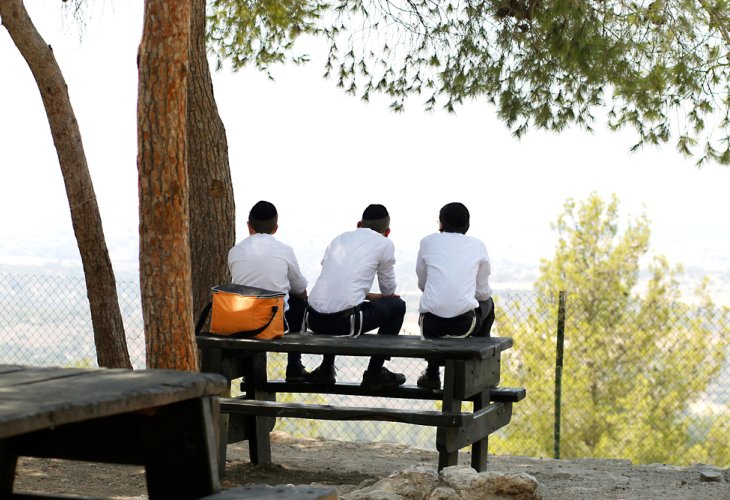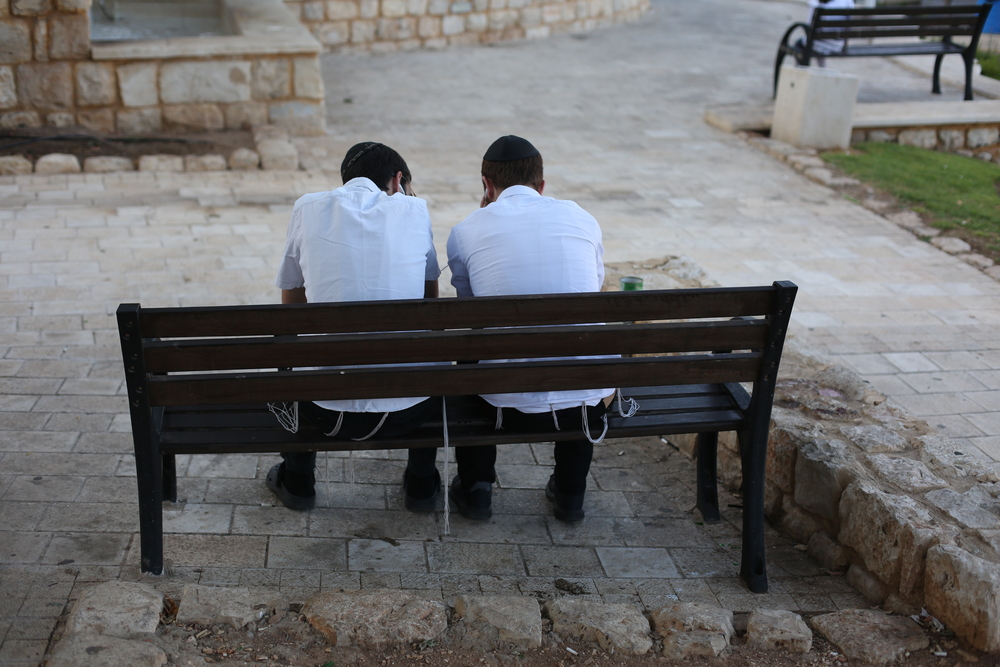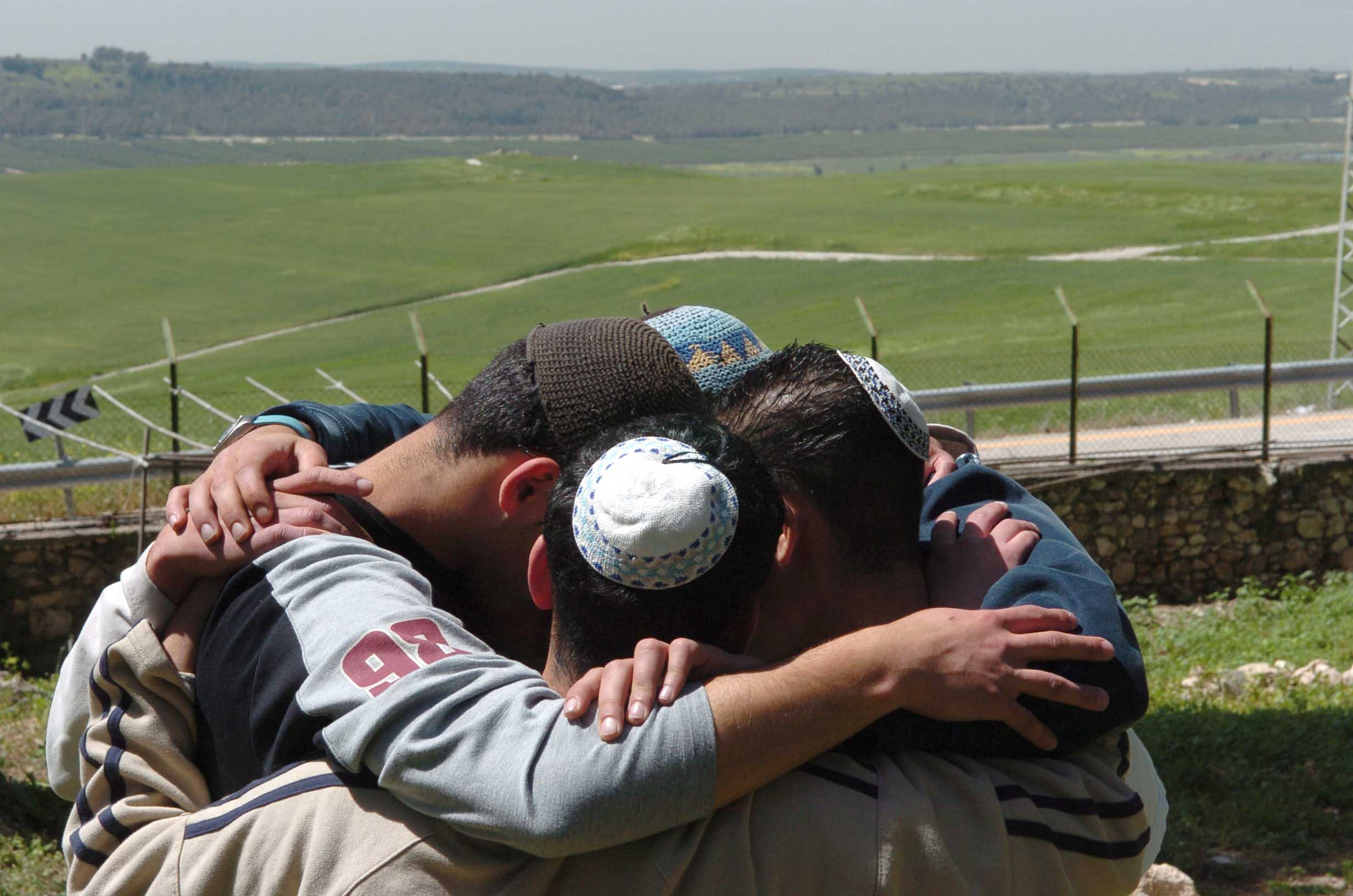A Heartfelt Interview with Yair's Mother: "They Are Our Children Too. Don't Give Up on Them So Quickly"
Yair has a shirt with an 'X' just like the others, but his mother pleads: Don't mark him with a giant 'X'. He may have left the yeshiva, but he observes Shabbat and wears *tzitzit*. Like many others labeled as 'fringe youth', they are still our children. Open your hearts, help them climb out of the pit, and don't leave them on the fringes.
 (Illustration photo: shutterstock)
(Illustration photo: shutterstock)When Bnei Brak was ablaze with folly, hatred, and fear, and the media fueled the flames with bloodthirst, MK Gafni ascended the Knesset podium and claimed that the vast majority of the religious community obeys the law and would not commit such acts. He noted that the youths accused in the bus arson were marginalized and not representative of the religious community.
Hearing this, Liat Barel, Yair's mother, couldn't remain silent. That evening, she wrote a heartfelt letter to MK Gafni. Although she didn't send it to him, she shared it with her friends. The contents resonated deeply and spread among thousands of readers, eventually reaching MK Gafni, who publicly apologized.
Liat hopes her letter will spark change regarding youths who've lost their way. "I wrote this letter because of the shirt hanging in my son's closet... Yes. MK Gafni pointed to the 'X' shirts of the youths in the arson video, declaring: 'Those wearing the 'X' shirt are not ours.' It pained me deeply. Yes, my Yair has one of those shirts. Yair's friends, some were there, and I definitely don't justify their actions. But I can't forget the mothers of these unfortunate youths. I know if this had happened a year and a half ago, my Yair might have been among the offenders.
"By Hashem's grace, Yair is now on a path away from the dubious street gangs, urging his friends to turn back to good. His life's turnaround is our miracle, teaching me that every child has a chance. These youths, with their 'X' shirts and perhaps a hidden kippah, are still our youths. They act out only because they struggle. They've lost their way and fallen too deep. If we ostracize them, we risk losing them entirely. We must extend a hand with a long enough rope to pull them out of the pit. Their mothers await them at home, crying every night.
Liat recalls the painful journey with Yair and agrees to share their tears, pains, insights, and lessons. Liat returned to Judaism before marrying Gal. Together, they built a religious home and sought a place for their roots. "We sought a good place for our children's education and decided to settle in Bnei Brak, a city of Torah. The neighbors and friends welcomed us warmly. Even our daughters were seamlessly admitted into prestigious schools. Though our backgrounds differed, my husband Ashkenazi and I Sephardi, we ran our home with Ashkenazi customs. Sometimes, the neighborhood kids teased our children, but we strengthened them, and they rarely faced such taunts again.
Yair, Liat's third child, grew up and easily got accepted into an excellent Torah school. The parents were very satisfied. However, he encountered difficulties. Liat explains he had learning disabilities and attentional challenges but strove to overcome and was a good child. Not brilliant, but he managed with his studies over the years. Social adaptation was even more challenging. Yair faced social difficulties, and his parents couldn't help:
"Yair heard hurtful remarks, and we struggled to assist with his social battles. We didn't know who to talk to or whom to approach when problems arose.
 (Illustration photo: shutterstock)
(Illustration photo: shutterstock)"In eighth grade, Yair had a superb teacher who truly appreciated him. He helped Yair in class, encouraged his progression, and advised us on yeshiva registration. Thanks to him, Yair was accepted into a prestigious yeshiva, or so we thought. Unfortunately, Yair's social problems worsened in yeshiva, and no one supported him. He was a charismatic child leading his friends, with occasional childlike antics. Just 13, but some peers, themselves children who didn't consider their actions' impact, isolated him. The social exclusion was severe: no one spoke or engaged him. In the rare interactions, conflicts intensified, and Yair faced punishments. Isolated and suffering greatly, he lost all taste for yeshiva life. Without our realizing the social struggles he faced.
"When the issue blew up, and he revealed his recent struggles, it was too late. Emotionally wounded, Yair distrusted adults to protect him. Reluctant to return to yeshiva, we searched intently for an alternative framework. He joined a lesser yeshiva where they tried assisting him. I can't find fault with them; the head of yeshiva was exceptional, but Yair's descent continued. Shortly thereafter, the yeshiva closed, leaving Yair without a proper framework.
"We sought a fitting educational environment for Yair, one where he’d be loved and nurtured. Even before we found such a place, a yeshiva registrar spoke with Yair and, unbeknownst to us, enrolled him in a yeshiva. We were shocked he registered a 15-year-old without consulting parents, but it was done. Yair checked out the yeshiva and swiftly decided it didn't suit him, losing interest in the yeshiva world entirely. Roaming the streets with unsuitable friends, his clothing changed, and neighborhood residents began viewing him suspiciously. We sought educational institutions, even asking municipal help, who said: 'If a child doesn't wish to help himself, I can't help.' Speechless, how could one raise hands in defeat?
"I don't fault them; I voice great sorrow that once on the streets without structure, decline is rapid. Some friends stopped observing Shabbat, much to our chagrin. Thankfully, Yair observes Shabbat and continues wearing prestigious *tzitzit*. He hasn't abandoned Torah but was drawn to new street-found friends. Bored, lost, unoccupied, soon he was involved in vandalism. Only then did he realize his situation's depth, agreeing to disconnect from such friends. Now, two years later, those youths remain entrenched, but Yair alone persisted in change, returning to good behavior."
What's your secret? How did he manage to recover and rehabilitate despite everything?
"There's no magic. But I always supported and wanted to help him, notwithstanding our immense pain. He saw our breakdown over his situation. Unbelievable where he wandered, yet even in shock and grief, I always knew he was my son. Setting anger aside, I sought how we could help him climb out, never abandoning him in distress. He knew that. I'm sure he felt our constant presence, regardless of his actions.
"Thank Hashem, he truly emerged from the decline, understanding right after his 'last moment'. But he was saved. Integrated into a special city youth project, connections led to the 'Yedidim' organization. Helping stranded drivers, he contributes his talent and time, very satisfied. Today, he's part of another youth center initiative, studying to become a medic.
"During the pandemic, he and friends were recruited for positive activities, distributing food to the isolated. These initiatives save our youths. They're saving lives — spiritually, mentally, physically, remembering and investing in them before they fall. Thanks to volunteers and righteous individuals who care for youths, today Yair is in a completely different place than two years ago. Matured, he's responsible, acting positively, and joyful. Upon learning of the Bnei Brak riot, I was confident didn't join the rioters. Thank Hashem, I was right. Yet I feared he might have been among them. If no one had extended a hand at the crucial moment, he could have continued declining, who knows where he'd be.
"A terrifying thought, motivating action for them. That's why I wrote MK Gafni's letter, sought a meeting at his office. Don't abandon these unfortunate youths. Extend a hand and save them. My heart aches for their mothers, those tangled in such events. Especially as public fallout likely leads to harsher penalties. Yair's friend was jailed in Afik Prison after a video of him blocking the road with a bin circulated. Detained 12 hours without water or contact, later approached demeaningly, disgracefully, without investigations on his actions. Not justifying severe acts but sometimes punishment exceeds their due. Remember, they're children without educational frameworks, having nothing grounding them. They have nothing to lose; no yeshiva wants them.
These boys need a kind word. Proper support, community embrace deters decline. Show they're loved. Secure fitting frameworks to save them. We can't expel them to dispose of the problem. The problem only burns beneath the rug. These youths are ours, part of us. We can't decide a child's success means ‘ours’, failure ‘not’. We have excellent youth, exemplary yeshiva students, yet these youths also belong. Responsibility extends to those 'expelled', ensuring constructive, rehabilitative surroundings.
 (Illustration photo: Nath Shiloh / Flash 90)
(Illustration photo: Nath Shiloh / Flash 90)How can frameworks be provided for children who resist them?
"There are multiple ways. From my experience, I recommend educators and guides who themselves are "baalei tshuvah". They know the general world, appealing to the youths, and also our world of Torah and mitzvot, serving as a bridge between them, aiding lost youths. It requires new experiences, out-of-the-box thinking, and goodwill. Possible, vital."
Liat concludes with a plea from the heart: "Pay attention to these children. Don't give up on them so quickly. Help them return to us."

